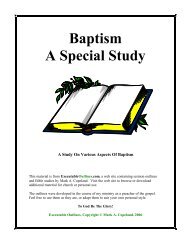The Epistle To The Hebrews - Executable Outlines
The Epistle To The Hebrews - Executable Outlines
The Epistle To The Hebrews - Executable Outlines
Create successful ePaper yourself
Turn your PDF publications into a flip-book with our unique Google optimized e-Paper software.
-- Thus a high priest would need to be well acquainted with the “human condition”<br />
Mark A. Copeland<br />
[<strong>The</strong> parallel between high priests in the OT and Jesus as our High Priest does not hold true in every<br />
minute detail (e.g., He 7:26-27). But certainly in the most fundamental ways Jesus has the qualities to<br />
be our High Priest, as we now consider...]<br />
II. CHRIST’S QUALIFICATIONS AS HIGH PRIEST (5-8)<br />
A. DIVINELY APPOINTED... (5,6)<br />
1. Christ was Divinely called to serve as High Priest, just as Aaron was<br />
2. As evidence of His calling, two Messianic prophecies are offered...<br />
a. His position as God’s Son - cf. Psa 2:7<br />
b. His appointment as a priest after the order of Melchizedek - cf. Psa 110:4<br />
-- As God’s Son, sitting and ruling at the right hand of God (cf. Psa 110:1-3), His calling<br />
as a priest is only natural<br />
B. SYMPATHETIC BECAUSE OF HIS OWN SUFFERINGS... (7,8)<br />
1. While “in the days of His flesh”, Christ...<br />
a. “offered prayers and supplications with vehement cries and tears”<br />
b. He prayed “to Him who was able to save Him from death”<br />
c. He was heard “because of His godly fear”<br />
2. That Jesus would have “godly fear” and offer such prayers provides insight into the extent of<br />
His temptations and sufferings in the flesh- cf. also He 2:18; 4:15<br />
3. Even though He was God’s Son, by the things which He suffered “He learned obedience”<br />
- what does this mean?<br />
a. Certainly He knew obedience as the Son of God<br />
b. Perhaps it means He came to know what obedience involved as one “in the flesh” (i.e.,<br />
the challenge of obedience in the midst of suffering, temptations, etc.)<br />
-- Through His suffering, Jesus certainly understands the “human condition” which qualifies<br />
Him to serve as High Priest<br />
[Qualified by virtue of His calling and His compassion to be a High Priest, what kind of High Priest is<br />
Christ? <strong>The</strong> next two verses introduce two themes that will be developed much further later on...]<br />
III. CHRIST’S CALLING AS OUR HIGH PRIEST (9,10)<br />
A. “THE AUTHOR OF ETERNAL SALVATION...” (9)<br />
1. “Perfected” by virtue of His sufferings “in the flesh”, He has become the “author” of eternal<br />
salvation<br />
a. <strong>The</strong> word “author” comes from aitio, meaning literally, “cause”<br />
b. Later, we will see how Christ is the “cause” of our salvation - cf. He 7:24-27<br />
2. But for now, note that He is the cause of salvation for “all those who obey Him”<br />
a. Is obedience necessary for salvation? Consider these verses:<br />
1) Jesus will bring vengeance on those who have not obeyed the gospel - 2 Th 1:7-9;<br />
cf. 1 Pe 4:17-18<br />
2) Paul sought to bring about the “obedience to the faith” among all the nations - Ro<br />
1:5; 16:25-26<br />
a) But not all had obeyed the gospel - Ro 10:16<br />
b) Yet he was grateful for those who had - cf. Ro 6:17,18<br />
Sermons From <strong>Hebrews</strong> 38

















